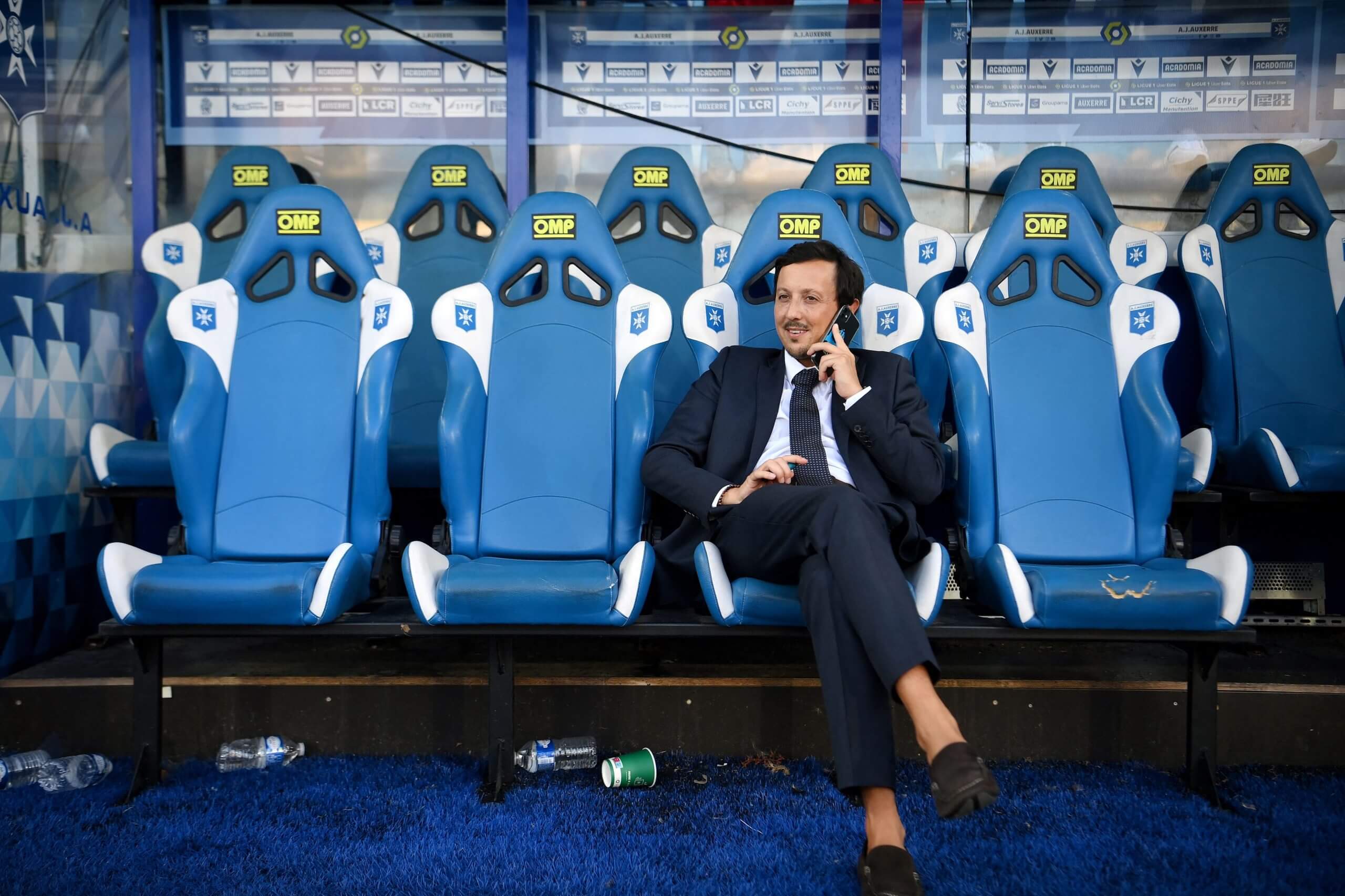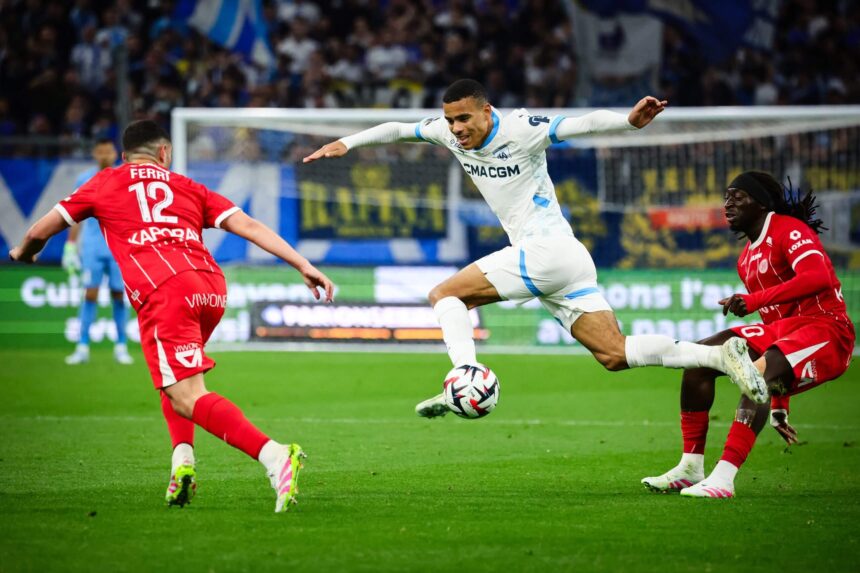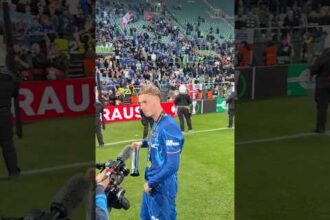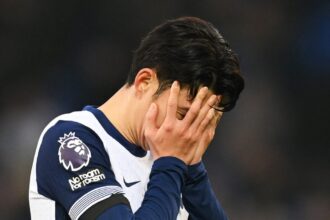In the rich and frequently chaotic history of Marseille, there can have been fewer more apt demonstrations of the club’s inherent tendency towards turbulence than the decision to head to Rome for some peace and quiet in the same week as the death of the Pope.
With Champions League qualification in the balance in Ligue 1, Marseille head coach Roberto De Zerbi and the club’s directors elected to enact a ritiro — an Italian word meaning ‘retreat’ — to focus minds before the four final league games of the season. After failing to find suitable facilities in the south of France, preparations were being made on Monday for a 50-strong delegation from the club to establish a training camp in the Italian capital when news broke of the passing of Pope Francis.
Advertisement
If De Zerbi and his players were going to Rome, they were going to be accompanied by the global media and hundreds of thousands of grieving Catholic pilgrims from around the world. However hard they may try to flee it, Marseille somehow always manage to find themselves slap bang in the middle of the spotlight.
De Zerbi has already taken his squad away from their home this season, after doing something similar in November, but the stakes now could scarcely be higher. Marseille, who sit second in Ligue 1 behind runaway champions Paris Saint-Germain, are only four points better off than Strasbourg in seventh and, with so many teams vying for a top-four finish and Champions League qualification, their season is on a knife-edge.
Marseille invested heavily in new players since last summer and with French football once again mired in financial uncertainty due to the ongoing Ligue 1 TV rights crisis, De Zerbi’s side simply cannot afford to miss out on a place at European football’s top table. And nobody at the club denies it. As director of football Medhi Benatia told regional newspaper La Provence last week, “If there’s no Champions League, it will be a catastrophe.”
A forthcoming gala match to celebrate the club’s 125th anniversary has only added to the sense of gravity. With Jean-Pierre Papin, Basile Boli, Didier Drogba, Samir Nasri and Franck Ribery among the former Marseille stars set to lace up their boots again at the Stade Velodrome on May 2, the onus is on the current squad to show that they are worthy inheritors of the club’s proud traditions.
De Zerbi has succeeded in putting his stamp on Marseille’s football and his side remain on course for Champions League qualification, but the next three weeks will be pivotal. Marseille is the kind of club where, even when things are going well, the next crisis is never far away.
Marseille have been among the leading contenders for Champions League qualification since thrashing Brest 5-1 on the season’s opening day, but a recent run of four defeats in five games — culminating in a 3-1 loss at relegation-threatened Reims in late March — sent the club into the latest in a long line of tailspins.
Advertisement
“I get the impression that some of these guys don’t want to get into the Champions League,” midfielder Adrien Rabiot said of his team-mates after the game at Reims. De Zerbi echoed his frustrations. “The mentality I see is not the one I want for my team,” said the former Brighton & Hove Albion head coach. “We’ve lost that inner fire to win these matches.”
De Zerbi responded by forcing his players to spend the night after the Reims defeat at La Commanderie, the club’s training centre, and cancelling the two scheduled days off. Rather than relaxing with their families or jetting off to foreign climes for a short break, they instead found themselves being put through gruelling training exercises and long video analysis sessions. The word crise — or crisis — began to crop up with increasing regularity.
Further fuel was added to the fire six days after the Reims match when L’Equipe published an explosive story claiming the club had witnessed “the start of a mutiny” between De Zerbi and the first-team squad.
Irritated by the players’ lack of investment, the Italian had, according to the paper, refused to take charge of a training session on the Monday afternoon following the game and his charges had reacted by declaring that, in that case, they would not train. L’Equipe said it had taken Benatia’s intervention to defuse the situation.
In a subsequent press conference, held to preview Marseille’s home game against Toulouse, striker Neal Maupay dismissed the suggestion that the players had momentarily gone on strike. “It was never a question of not training,” he said. De Zerbi, meanwhile, was unrepentant, saying: “I have nothing to apologise for.”
A 3-2 win over Toulouse, secured courtesy of spectacular second-half goals by Mason Greenwood and Rabiot, drew a line under the affair. The message from the club was that it was business as usual.
Mason Greenwood joined Marseille permanently last summer (Clement Mahoudeau/AFP via Getty Images)
“The story went way too far,” a senior club source, speaking anonymously to protect relationships, told The Athletic. “We were simply disappointed with the players’ performance (against Reims). The coach told them so and he was right.
“He preferred to take a step back for a couple of days, observe the training sessions from a distance and look at the (players’) behaviour — with, of course, the approval of the president (Pablo Longoria) and the director of football.
Advertisement
“The players said themselves that there were no problems with the coach. It’s quite the opposite — everyone is behind him. It was a lot of fuss over not much.”
Although De Zerbi’s short-fuse management style has created friction this season, he continues to enjoy the full support of Benatia and president Longoria.
Despite recent reports in the Italian sports media linking him with a move to Milan, there is confidence at the highest levels of the club that he would stay on at the Velodrome even if Marseille were to miss out on a Champions League place.
Marseille’s American owner, Frank McCourt, who purchased a 95 per cent stake in the club in 2016, had already planned to attend the home game against Toulouse and he spoke to the players in the changing room after the game. McCourt is untroubled by the reports of tensions between De Zerbi and his players and retains full confidence in Longoria’s ability to run the club.
Suggestions that Marseille’s players had refused to train inevitably resurrected memories of the infamous training-ground strike at the South African resort of Knysna that contributed to the France national team’s spectacular derailment at the 2010 World Cup. One training-ground source spoke of a week of whispers between staff members about what had happened, which, coupled with the team’s dismal form, created an “electric” atmosphere at La Commanderie.
Another source close to the first-team squad offered a nuanced take on what had taken place between De Zerbi and his players. “It wasn’t a ‘mutiny’, like Knysna,” the source said. “It didn’t go that far. Things got heated between them. ‘Who does he think he is? We’re not going to train’. That maybe lasted 30 minutes. But it was the kind of thing that happens in a squad. Medhi came down, he spoke to them for half an hour, and it was all sorted.”
Marseille are no strangers to crises. In the past four years alone, there has been an attack on the training centre by irate ultras, the abandonment of two league matches due to fan disorder, a 12-month transfer ban imposed by FIFA (subsequently overturned by the Court of Arbitration for Sport), a head coach — Marcelino — leaving the club after claiming to have been threatened by supporters, a fan attack on the Lyon team bus that nearly cost visiting coach Fabio Grosso an eye, and multiple instances of turmoil behind the scenes. As former defender Marcel Desailly once said: “In terms of intensity, one year at this club is worth three or four seasons at any other.”
Advertisement
After beating Toulouse, Marseille lost 3-0 at Monaco, who temporarily replaced them in second place, before De Zerbi’s side bounced back last weekend with a thumping 5-1 demolition of bottom club Montpellier.
“It’s been a difficult few weeks for everyone,” English winger Jonathan Rowe, scorer of a superb volleyed flick against Montpellier, told LFP Media after the game. “But we’ve stuck together and we’ll continue to stick together until the end of the season.”
✨ 𝗠𝗮𝗴𝗶𝗰 𝗝𝗼𝗻𝗻𝘆 𝗮𝘁 𝘆𝗼𝘂𝗿 𝘀𝗲𝗿𝘃𝗶𝗰𝗲 🎩
Our No. 1️⃣7️⃣ finishes brilliantly from an awesome Ulisses Garcia delivery 🥰#OMMHSC | #SublimeCôteDivoire pic.twitter.com/EEvEDC5NsT
— Olympique de Marseille 🇬🇧 🇺🇸 (@OM_English) April 21, 2025
The rollercoaster nature of Marseille’s campaign is reflected in the statistics. Marseille had not scored so many goals (62) after 30 games of a top-flight campaign since the 1989-90 season, but had not conceded so many (42) at that stage since 1984-85. While it has rarely been dull, it has left Marseille with precious little margin for error in their bid to secure automatic Champions League qualification for the first time since 2022.
“It’s very important for Marseille to qualify for the Champions League,” says the club’s former midfielder Jean-Charles De Bono, who works as a pundit for independent media company Football Club de Marseille.
“Would the Europa League be enough for De Zerbi, for example? And for players like Rabiot and Greenwood who’ve come to play in the Champions League? Without the Champions League, it will be difficult to continue to operate like a European-level club.”
De Zerbi’s appointment by Marseille in June 2024 raised eyebrows across the football world.
The Italian had earned huge plaudits for his work with Sassuolo, Shakhtar Donetsk and Brighton, having succeeded in giving all three teams an exciting, possession-focused footballing identity, and had been linked to some of Europe’s biggest clubs. Manchester United held talks with him last summer before electing to keep faith with Erik ten Hag and he was also reported to have been a candidate to succeed Mauricio Pochettino at Chelsea.
Advertisement
So why choose Marseille, a perennially unstable club with impossibly demanding supporters who had not won a league title in 14 years, had finished eighth the previous season and did not even have so much as a Conference League campaign to look forward to? For De Zerbi, it was quite simple. He wanted to feel something.
“Coaching Marseille is unique,” he told Italian news outlet Zeta. “You have a whole people behind you… I chose Marseille because they remind me of the passion and the pressure I experienced at Foggia (where he played and coached). The Stade Velodrome holds nearly 70,000 people and (the atmosphere) gets really hot. Environments like that push me to give the best of myself.”
De Zerbi had experienced the Velodrome’s fervour first-hand last season, having overseen a 2-2 draw between Brighton and his future employers in front of 63,465 spectators in the Europa League group stage. The 45-year-old has spoken about needing to feel “adrenaline”, wanting to get “goosebumps” and dreaming of “making the Velodrome explode”.
It is not the first time Marseille’s decision-makers have attempted to harness the capricious energy of the Velodrome by hiring a comparably temperamental head coach, with Marcelo Bielsa, Jorge Sampaoli, Igor Tudor and Gennaro Gattuso among De Zerbi’s predecessors. None of them lasted longer than 16 months.
It was therefore notable that De Zerbi signed a three-year contract. His appointment, coupled with Benatia’s arrival a year earlier and an ambitious player recruitment drive (Greenwood, Rabiot, Pierre-Emile Hojbjerg, the since-departed Elye Wahi), was intended to usher in a new era of stability at a club that has long been synonymous with the complete opposite.
Staff working at La Commanderie quickly became accustomed to the sound of De Zerbi’s instructions — bellowed at his players in a mix of Italian and English — echoing around the training ground. The lack of involvement in European competition enabled him to lead long, detailed tactical sessions on the training pitch and Marseille soon began to look like a De Zerbi team: dominating possession with flurries of short passes and patiently building up attacking sequences from the back.
“The coach has given us a lot,” Marseille captain Leonardo Balerdi tells The Athletic.
Advertisement
“He’s allowed me to understand football differently. Before, I was just a defender. Now, I’m a complete player. Everyone in the team has to be comfortable with the ball and he focuses on every little detail. There’s a reason behind every single thing we do on the pitch.”
Both the volcanic and more creative sides of De Zerbi’s personality as a coach have come to the fore over the campaign. Following a 3-1 loss at home to Auxerre in early November, which came hot on the heels of a one-sided 3-0 home defeat by PSG, he delivered a remarkable press-conference performance in which he threatened, unprompted, to walk away from the club. “If the problem is me, I’ll go and I’ll leave the money,” he said.
Such emotional outbursts have not been uncommon. Although De Zerbi’s direct, straight-talking style has been hailed both within the club and by many of Marseille’s similarly hot-blooded supporters, one source indicates that it has occasionally left the players feeling like they are walking on eggshells. But at senior levels, there is a feeling that De Zerbi’s occasional broadsides have tended to provoke positive reactions from his players.
In Marseille’s next outing, which followed the November international break, De Zerbi happened upon a new playing system that transformed their season: a 3-4-3 formation with attacking wing-backs and Rabiot and Greenwood playing in support of a lone striker. They won 3-1 at Lens in their new configuration and the victory proved the spur for a run of form that turned them into the frontrunners for Champions League qualification behind PSG.
There followed an innovative four-day training camp in a town called Mallemort, an hour’s drive south of Avignon, where De Zerbi’s players awoke at dawn for early-morning runs, trained extensively and ate together three times a day. “That training camp was really necessary because we were a new team,” says Argentina international Balerdi, who De Zerbi appointed captain last summer. “We talked about all sorts of things and it helped us all get to know each other. Without that training camp, I’m not sure we’d be second in the table today.”
All the while, De Zerbi and his players have been buffeted by the kind of crosswinds in which Marseille have long specialised. In late February, Longoria was hit with a 15-game ban after responding to another defeat against Auxerre by accusing French referees of “corruption” and hinting Marseille were the victims of a grand conspiracy.

Pablo Longoria is serving a lengthy ban (Franck Fife/AFP via Getty Images)
Sporting advisor Fabrizio Ravanelli received a three-game suspension for his conduct after the same game, while the straight-talking Benatia is currently serving a three-month ban for remonstrating with the fourth official during a Coupe de France penalty shootout defeat by Lille. Combined with De Zerbi’s frantic touchline antics and heart-on-sleeve public utterances, it has made for a dangerously heady concoction.
Advertisement
De Zerbi has taken strong decisions in his attempts to arrest Marseille’s recent dip in form, with both 20-goal top scorer Greenwood and winger-turned-wing-back Luis Henrique finding themselves unceremoniously benched for key fixtures. The Italian helped to convince Greenwood to join Marseille and made several clumsy attempts to downplay the significance of the serious accusations that had precipitated the 23-year-old forward’s departure from Manchester United, but he has expressed frustration over his inconsistency and disinclination towards defensive work.
“Nobody can hold him in higher esteem than me, but I expect more from him because what he’s doing isn’t enough for us,” De Zerbi said last month. “If he wants to maintain his ambitions of becoming a champion, he has to be more consistent, more decisive and make more sacrifices.”
Despite all the sensational headlines, De Bono is convinced De Zerbi continues to enjoy the support of the famously fickle Marseille faithful.
“I have the feeling the majority of the fans in Marseille are behind De Zerbi and want him to stay,” he says. “He’s signed a three-year contract and I don’t think he’s here to make a quick buck.
“He is here to give people joy. He wants people to enjoy coming to the stadium. That’s what he’s held against the players — he wants them to pay back what they get from the fans who are there all the time by playing great football, winning matches and getting into the Champions League.”
As the season nears its crescendo, the volume around Marseille has only been getting louder. Longoria saw fit to issue a rallying cry (via renowned rallying cry platform LinkedIn) calling for unity before last weekend’s win over Montpellier. Benatia’s interview with La Provence, published on the morning of the game, went even further, accusing the players of “mental failings”, lashing out at “moles” in the camp for leaking information to the media, and accusing people within the club of acting against Marseille’s best interests.
“I’ve never seen an environment where, when things aren’t going well on the pitch, people inside the club try to cause trouble,” said the former Bayern Munich and Juventus centre-back, who came through the Marseille youth ranks as a player.
Advertisement
The ritiro is not a tradition native to French football, but it is a tried-and-tested formula in the Italian game, the theory being that there is no better way to get a squad of players pulling in the same direction than by shutting them away from the outside world for days on end.
Marseille’s players have spent this week in Rome, miles away from their families and friends back home, staying at a five-star hotel in the north of the city and training at facilities used by Serie D side Roma City FC. Plans are in place for the squad to return to the Italian capital next week, although a final decision was not being made until after Sunday’s 4-1 win against Brest.
“It’s been good,” said skipper Balerdi shortly before flying back to Marseille with the rest of the squad on Friday. “We’ve worked, we’ve done different activities, we went out for dinner at a restaurant, we had a barbecue at the hotel. All of that helps to bring us together.
“The coach asked us for our opinion on the training camp and we were all 100 per cent behind him. We knew it was for the good of the team and the institution. It wasn’t easy to organise because our whole lives are in Marseille, but the last weeks of the season are always hard, mentally and physically, so it was a magnificent idea.
“The coach’s message is clear: we all want to qualify (for the Champions League). We know it’s what all the supporters are waiting for.”
With three games of the Ligue 1 season remaining, the tension levels around the club are unlikely to drop anytime soon. Marseille can at least reassure themselves that they have one of the kinder run-ins of the Champions League contenders, although they must still travel to third-place Lille.
As long as Champions League qualification remains within reach, the unity Longoria called for appears to remain. And the flipside of the club’s intense atmosphere is that when Marseille do have something to celebrate, it tends to be quite the party.
(Top photo: MIGUEL MEDINA/AFP via Getty Images)










